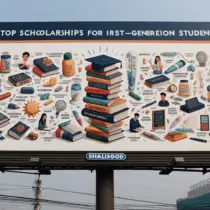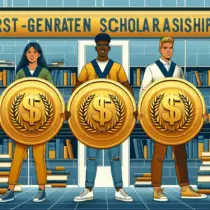Top Scholarships for First-Generation Students to Apply for in 2025
For many first-generation college students, pursuing higher education can be both an exciting and challenging journey. They are often the trailblazers in their families, navigating uncharted waters without the benefit of parental experience in higher education. One of the significant hurdles they face is the financial burden of college tuition and associated costs.
Fortunately, numerous scholarships are specifically designed to support first-generation students. These scholarships not only ease the financial strain but also recognize the hard work and unique perspectives that first-generation students bring to the academic community. Here’s a look at some of the top scholarships for first-generation students to apply for in 2025.
1. The Gates Scholarship
The Gates Scholarship is one of the most prestigious and generous scholarships available to first-generation students. Funded by the Bill & Melinda Gates Foundation, this scholarship covers the full cost of attendance, including tuition, fees, room, board, books, and other personal expenses. Each year, 300 students are selected based on their academic excellence, leadership abilities, and personal success.
Eligibility Requirements:
- First-generation college student
- High school senior
- Member of a minority group (African-American, American Indian/Alaska Native, Asian & Pacific Islander American, and/or Hispanic American)
- Minimum cumulative GPA of 3.3 on a 4.0 scale
- Demonstrated leadership abilities and community service
2. Dell Scholars Program
The Dell Scholars Program, initiated by the Michael & Susan Dell Foundation, provides financial assistance of $20,000 over six years to first-generation students. Additionally, the program offers non-monetary support such as a laptop, textbook credits, and personal support from Dell Scholars staff. The program aims to help students leverage their academic potential and professionalism to complete their education.
Eligibility Requirements:
- First-generation college student
- High school senior
- Participating in a Michael & Susan Dell Foundation approved college readiness program for a minimum of two years
- Minimum 2.4 GPA
- Pell grant eligible
3. Coca-Cola First Generation Scholarship
The Coca-Cola First Generation Scholarship is an initiative by the Coca-Cola Scholars Foundation to support first-generation college students. The scholarship provides $5,000 per year for up to four years of undergraduate study. Recipients are chosen based on their academic performance, leadership, and commitment to community service.
Eligibility Requirements:
- First-generation college student
- High school senior
- Minimum 3.0 GPA
- Demonstrated leadership and community service involvement
4. GE-Reagan Foundation Scholarship Program
The GE-Reagan Foundation Scholarship Program honors the legacy and character of President Ronald Reagan by recognizing first-generation students who demonstrate leadership, drive, integrity, and citizenship. The program offers $10,000 renewable scholarships for up to $40,000 per recipient.
Eligibility Requirements:
- First-generation college student
- High school senior
- Minimum 3.0 GPA
- Demonstrated leadership, integrity, and citizenship
5. The Horatio Alger Association Scholarship
The Horatio Alger Association Scholarship helps first-generation students who have demonstrated integrity, perseverance in overcoming adversity, and a commitment to pursuing higher education. The association offers both national and state scholarships, with the national scholarships providing up to $25,000.
Eligibility Requirements:
- First-generation college student
- High school senior
- Demonstrated financial need
- Involvement in co-curricular and community service activities
- Minimum 2.0 GPA
6. Jackie Robinson Foundation Scholarship
Named after the legendary baseball player and civil rights activist, the Jackie Robinson Foundation Scholarship provides up to $30,000 over four years for first-generation students. In addition to financial support, the foundation offers mentoring, leadership development, and guidance in choosing a college and career path.
Eligibility Requirements:
- First-generation college student
- High school senior
- Planning to attend an accredited 4-year college or university in the United States
- Demonstrated financial need
- Evidence of leadership potential and dedication to community service
7. Generation Google Scholarship
The Generation Google Scholarship aims to inspire and empower underrepresented students in computer science and technology. First-generation students who plan to pursue a degree in one of these fields can receive up to $10,000 through this scholarship.
Eligibility Requirements:
- First-generation college student
- High school senior or current undergraduate student
- Major or intend to major in computer science, engineering, or a closely related technical field
- Exemplify leadership and demonstrate a passion for improving diversity, equity, and inclusion in technology
8. Cameron Impact Scholarship
The Cameron Impact Scholarship is a highly selective, merit-based program that covers the full tuition, fees, and books for four years at any accredited U.S. college or university. The scholarship targets first-generation students who have demonstrated excellence in academics, extracurricular activities, leadership, and civic engagement.
Eligibility Requirements:
- First-generation college student
- High school senior
- Minimum unweighted GPA of 3.7
- Demonstrated leadership, community service, and extracurricular involvement
9. Burger King Scholars Program
The Burger King Scholars Program, funded by the Burger King McLamore Foundation, provides scholarships ranging from $1,000 to $50,000 to first-generation students. The program seeks to help students attend college and succeed in their academic and professional goals.
Eligibility Requirements:
- First-generation college student
- High school senior
- Minimum 2.5 GPA
- Active in the community through volunteering, sports, clubs, and/or religious organizations
10. QuestBridge National College Match Program
The QuestBridge National College Match program partners with top colleges to offer full four-year scholarships to first-generation, low-income students. The program provides a path for ambitious students to attend some of the nation’s best colleges and universities without financial worry.
Eligibility Requirements:
- First-generation college student
- High school senior
- Demonstrated financial need
- Excellent academic qualifications
Application Tips for First-Generation Students
Applying for scholarships can be a time-consuming process, but here are some tips to maximize the chances of success:
-
Start Early: Begin researching and preparing applications well in advance of deadlines. This gives ample time to gather required documents and craft strong personal statements.
-
Stay Organized: Keep track of scholarship deadlines, requirements, and application status using a spreadsheet or planner.
-
Tailor the Application: Write personalized essays and cover letters that address each scholarship’s specific criteria. Highlighting personal stories and experiences can make an application stand out.
-
Seek Guidance: Utilize resources such as school counselors, teachers, and mentors to seek feedback on applications and essays.
-
Proofread: Ensure all application materials are free of spelling and grammatical errors. Consider having a trusted person review the application before submission.
-
Follow Up: After submitting applications, follow up to ensure all materials have been received and check for any additional requirements.
In conclusion, first-generation students have unique challenges, but numerous scholarships are available to help mitigate financial barriers. The scholarships listed above are some of the top opportunities for first-generation college students in 2025. By taking advantage of these resources, these trailblazing students can focus on achieving their academic and professional goals.






